E-commerce Law in Canada: Regulations, Contracts, and Privacy Issues
VerifiedAdded on 2022/11/24
|13
|3332
|190
Report
AI Summary
This report provides a comprehensive overview of e-commerce law, focusing on the Canadian context. It explores various types of e-commerce, including B2C and C2C models, and delves into the legal framework governing online transactions. The report examines key aspects such as electronic contracts, jurisdictional issues, consumer protection, and privacy regulations. It discusses relevant legislation, including federal and provincial laws, and analyzes the enforceability of e-contracts, including click-wrap and web-wrap agreements. Furthermore, the report addresses the significance of e-signatures and the challenges of online privacy, covering data collection practices, privacy policies, and consumer rights. It also highlights the roles of regulatory bodies like the Canadian Competition Bureau and the impact of legislation like the Consumer Protection Act. The report concludes by emphasizing the need for businesses to comply with legal requirements to ensure secure and transparent online operations.
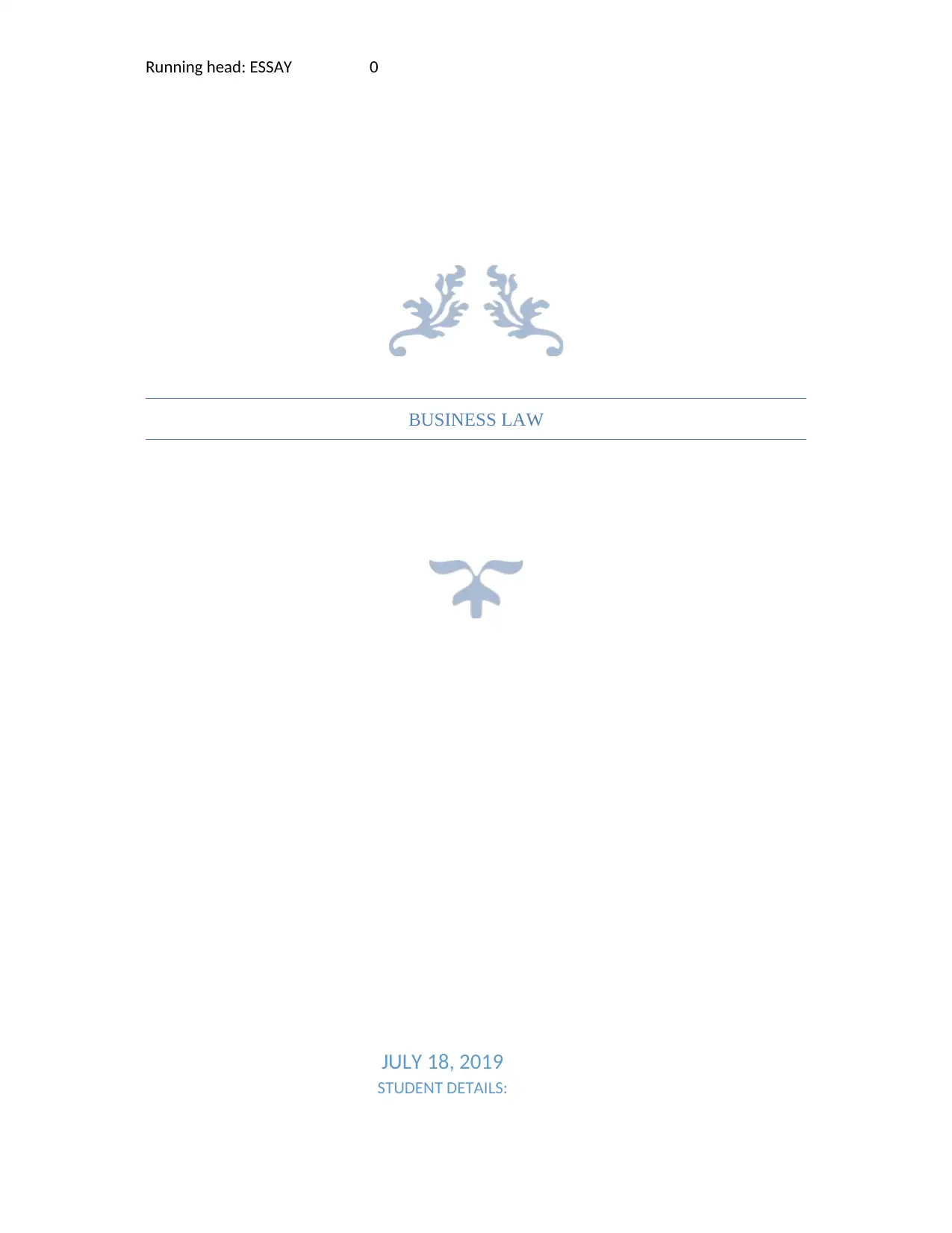
Running head: ESSAY 0
BUSINESS LAW
JULY 18, 2019
STUDENT DETAILS:
BUSINESS LAW
JULY 18, 2019
STUDENT DETAILS:
Paraphrase This Document
Need a fresh take? Get an instant paraphrase of this document with our AI Paraphraser
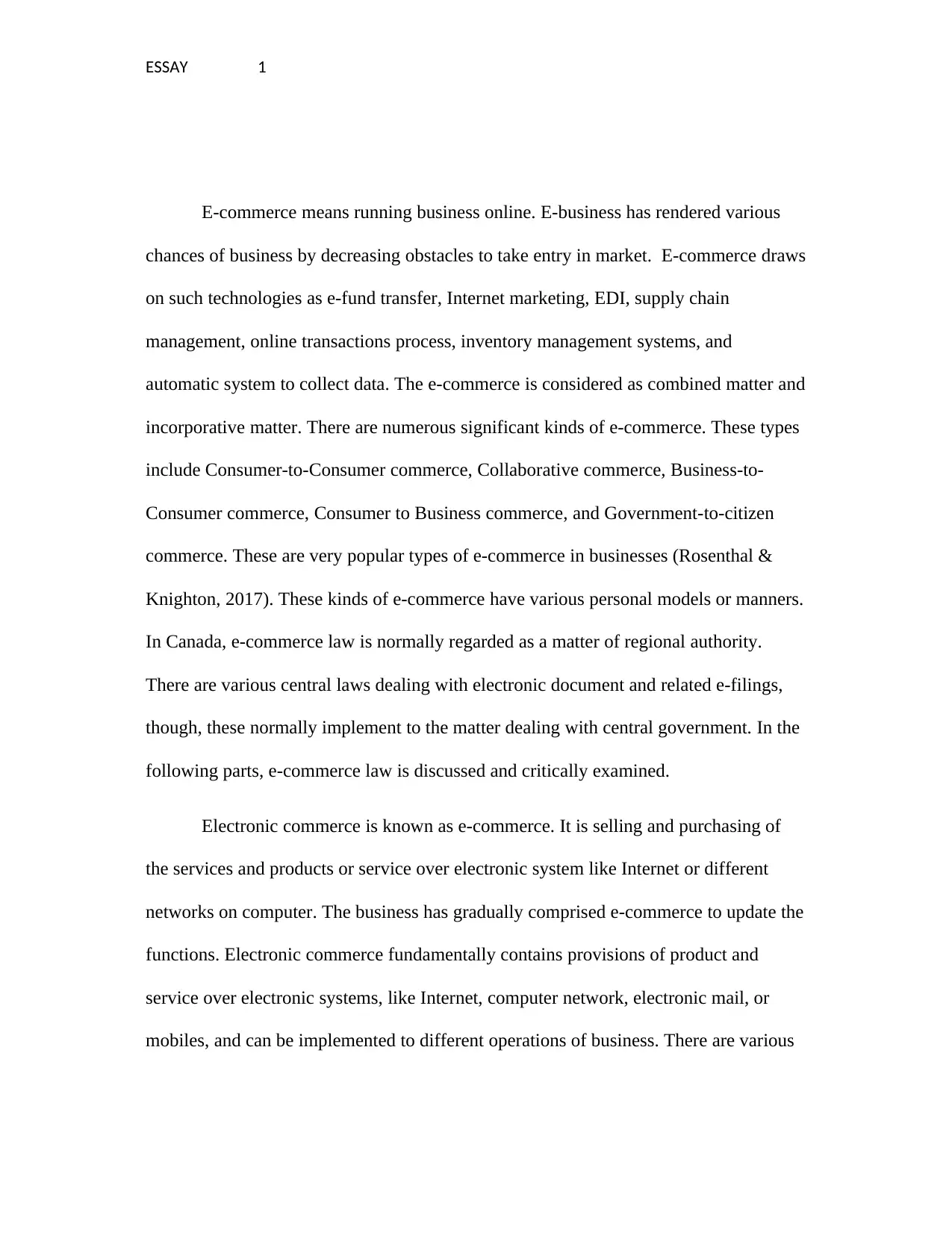
ESSAY 1
E-commerce means running business online. E-business has rendered various
chances of business by decreasing obstacles to take entry in market. E-commerce draws
on such technologies as e-fund transfer, Internet marketing, EDI, supply chain
management, online transactions process, inventory management systems, and
automatic system to collect data. The e-commerce is considered as combined matter and
incorporative matter. There are numerous significant kinds of e-commerce. These types
include Consumer-to-Consumer commerce, Collaborative commerce, Business-to-
Consumer commerce, Consumer to Business commerce, and Government-to-citizen
commerce. These are very popular types of e-commerce in businesses (Rosenthal &
Knighton, 2017). These kinds of e-commerce have various personal models or manners.
In Canada, e-commerce law is normally regarded as a matter of regional authority.
There are various central laws dealing with electronic document and related e-filings,
though, these normally implement to the matter dealing with central government. In the
following parts, e-commerce law is discussed and critically examined.
Electronic commerce is known as e-commerce. It is selling and purchasing of
the services and products or service over electronic system like Internet or different
networks on computer. The business has gradually comprised e-commerce to update the
functions. Electronic commerce fundamentally contains provisions of product and
service over electronic systems, like Internet, computer network, electronic mail, or
mobiles, and can be implemented to different operations of business. There are various
E-commerce means running business online. E-business has rendered various
chances of business by decreasing obstacles to take entry in market. E-commerce draws
on such technologies as e-fund transfer, Internet marketing, EDI, supply chain
management, online transactions process, inventory management systems, and
automatic system to collect data. The e-commerce is considered as combined matter and
incorporative matter. There are numerous significant kinds of e-commerce. These types
include Consumer-to-Consumer commerce, Collaborative commerce, Business-to-
Consumer commerce, Consumer to Business commerce, and Government-to-citizen
commerce. These are very popular types of e-commerce in businesses (Rosenthal &
Knighton, 2017). These kinds of e-commerce have various personal models or manners.
In Canada, e-commerce law is normally regarded as a matter of regional authority.
There are various central laws dealing with electronic document and related e-filings,
though, these normally implement to the matter dealing with central government. In the
following parts, e-commerce law is discussed and critically examined.
Electronic commerce is known as e-commerce. It is selling and purchasing of
the services and products or service over electronic system like Internet or different
networks on computer. The business has gradually comprised e-commerce to update the
functions. Electronic commerce fundamentally contains provisions of product and
service over electronic systems, like Internet, computer network, electronic mail, or
mobiles, and can be implemented to different operations of business. There are various
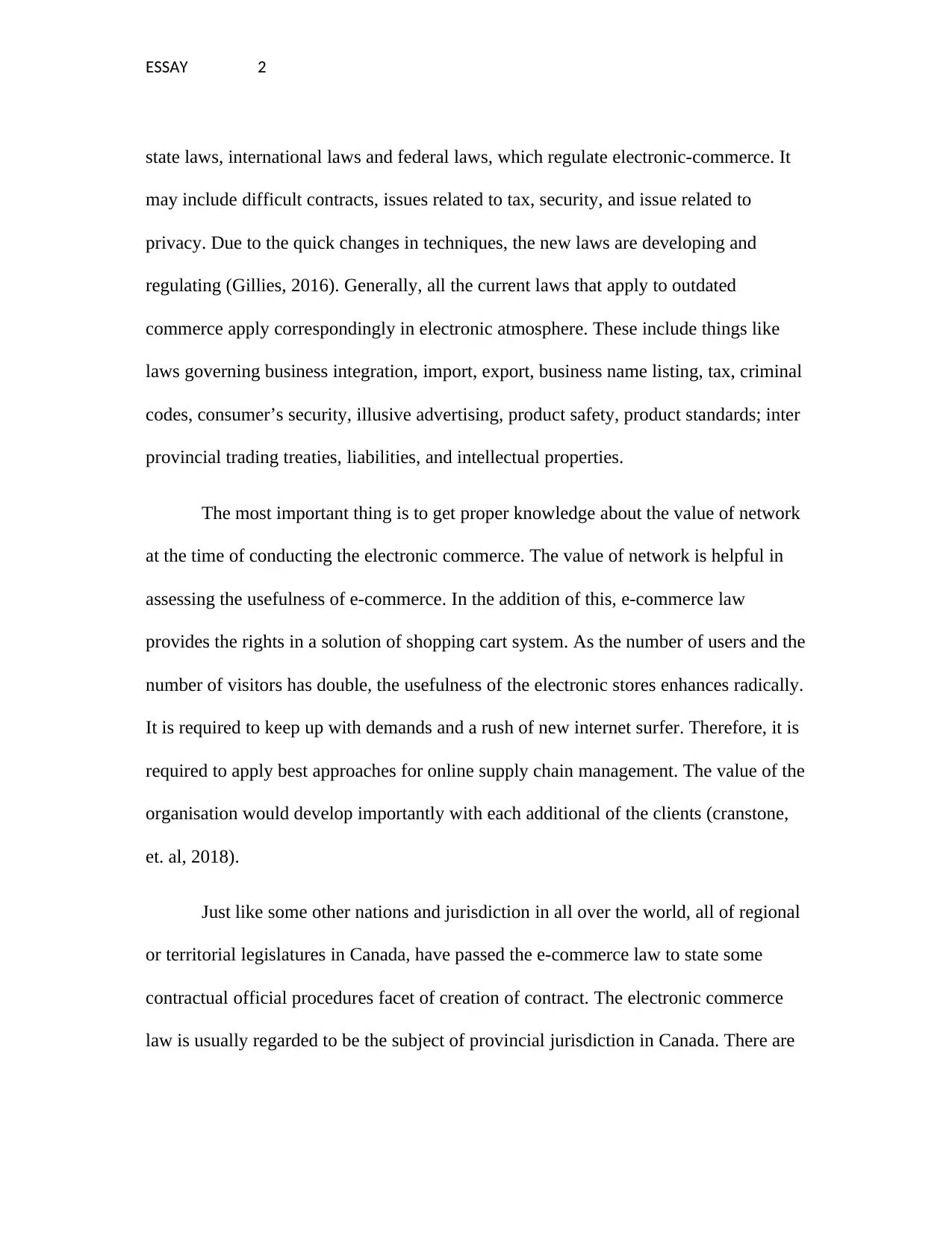
ESSAY 2
state laws, international laws and federal laws, which regulate electronic-commerce. It
may include difficult contracts, issues related to tax, security, and issue related to
privacy. Due to the quick changes in techniques, the new laws are developing and
regulating (Gillies, 2016). Generally, all the current laws that apply to outdated
commerce apply correspondingly in electronic atmosphere. These include things like
laws governing business integration, import, export, business name listing, tax, criminal
codes, consumer’s security, illusive advertising, product safety, product standards; inter
provincial trading treaties, liabilities, and intellectual properties.
The most important thing is to get proper knowledge about the value of network
at the time of conducting the electronic commerce. The value of network is helpful in
assessing the usefulness of e-commerce. In the addition of this, e-commerce law
provides the rights in a solution of shopping cart system. As the number of users and the
number of visitors has double, the usefulness of the electronic stores enhances radically.
It is required to keep up with demands and a rush of new internet surfer. Therefore, it is
required to apply best approaches for online supply chain management. The value of the
organisation would develop importantly with each additional of the clients (cranstone,
et. al, 2018).
Just like some other nations and jurisdiction in all over the world, all of regional
or territorial legislatures in Canada, have passed the e-commerce law to state some
contractual official procedures facet of creation of contract. The electronic commerce
law is usually regarded to be the subject of provincial jurisdiction in Canada. There are
state laws, international laws and federal laws, which regulate electronic-commerce. It
may include difficult contracts, issues related to tax, security, and issue related to
privacy. Due to the quick changes in techniques, the new laws are developing and
regulating (Gillies, 2016). Generally, all the current laws that apply to outdated
commerce apply correspondingly in electronic atmosphere. These include things like
laws governing business integration, import, export, business name listing, tax, criminal
codes, consumer’s security, illusive advertising, product safety, product standards; inter
provincial trading treaties, liabilities, and intellectual properties.
The most important thing is to get proper knowledge about the value of network
at the time of conducting the electronic commerce. The value of network is helpful in
assessing the usefulness of e-commerce. In the addition of this, e-commerce law
provides the rights in a solution of shopping cart system. As the number of users and the
number of visitors has double, the usefulness of the electronic stores enhances radically.
It is required to keep up with demands and a rush of new internet surfer. Therefore, it is
required to apply best approaches for online supply chain management. The value of the
organisation would develop importantly with each additional of the clients (cranstone,
et. al, 2018).
Just like some other nations and jurisdiction in all over the world, all of regional
or territorial legislatures in Canada, have passed the e-commerce law to state some
contractual official procedures facet of creation of contract. The electronic commerce
law is usually regarded to be the subject of provincial jurisdiction in Canada. There are
⊘ This is a preview!⊘
Do you want full access?
Subscribe today to unlock all pages.

Trusted by 1+ million students worldwide
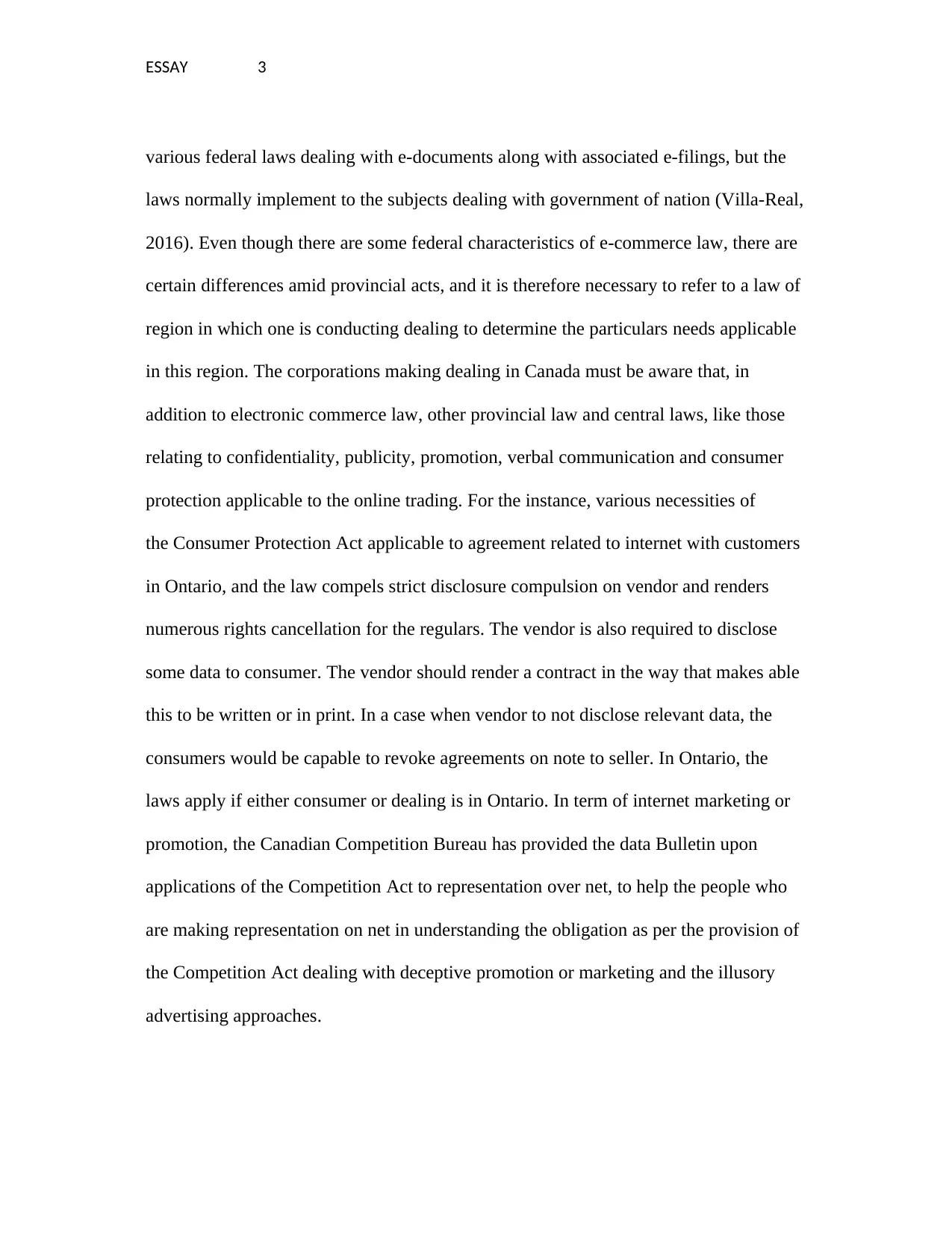
ESSAY 3
various federal laws dealing with e-documents along with associated e-filings, but the
laws normally implement to the subjects dealing with government of nation (Villa-Real,
2016). Even though there are some federal characteristics of e-commerce law, there are
certain differences amid provincial acts, and it is therefore necessary to refer to a law of
region in which one is conducting dealing to determine the particulars needs applicable
in this region. The corporations making dealing in Canada must be aware that, in
addition to electronic commerce law, other provincial law and central laws, like those
relating to confidentiality, publicity, promotion, verbal communication and consumer
protection applicable to the online trading. For the instance, various necessities of
the Consumer Protection Act applicable to agreement related to internet with customers
in Ontario, and the law compels strict disclosure compulsion on vendor and renders
numerous rights cancellation for the regulars. The vendor is also required to disclose
some data to consumer. The vendor should render a contract in the way that makes able
this to be written or in print. In a case when vendor to not disclose relevant data, the
consumers would be capable to revoke agreements on note to seller. In Ontario, the
laws apply if either consumer or dealing is in Ontario. In term of internet marketing or
promotion, the Canadian Competition Bureau has provided the data Bulletin upon
applications of the Competition Act to representation over net, to help the people who
are making representation on net in understanding the obligation as per the provision of
the Competition Act dealing with deceptive promotion or marketing and the illusory
advertising approaches.
various federal laws dealing with e-documents along with associated e-filings, but the
laws normally implement to the subjects dealing with government of nation (Villa-Real,
2016). Even though there are some federal characteristics of e-commerce law, there are
certain differences amid provincial acts, and it is therefore necessary to refer to a law of
region in which one is conducting dealing to determine the particulars needs applicable
in this region. The corporations making dealing in Canada must be aware that, in
addition to electronic commerce law, other provincial law and central laws, like those
relating to confidentiality, publicity, promotion, verbal communication and consumer
protection applicable to the online trading. For the instance, various necessities of
the Consumer Protection Act applicable to agreement related to internet with customers
in Ontario, and the law compels strict disclosure compulsion on vendor and renders
numerous rights cancellation for the regulars. The vendor is also required to disclose
some data to consumer. The vendor should render a contract in the way that makes able
this to be written or in print. In a case when vendor to not disclose relevant data, the
consumers would be capable to revoke agreements on note to seller. In Ontario, the
laws apply if either consumer or dealing is in Ontario. In term of internet marketing or
promotion, the Canadian Competition Bureau has provided the data Bulletin upon
applications of the Competition Act to representation over net, to help the people who
are making representation on net in understanding the obligation as per the provision of
the Competition Act dealing with deceptive promotion or marketing and the illusory
advertising approaches.
Paraphrase This Document
Need a fresh take? Get an instant paraphrase of this document with our AI Paraphraser
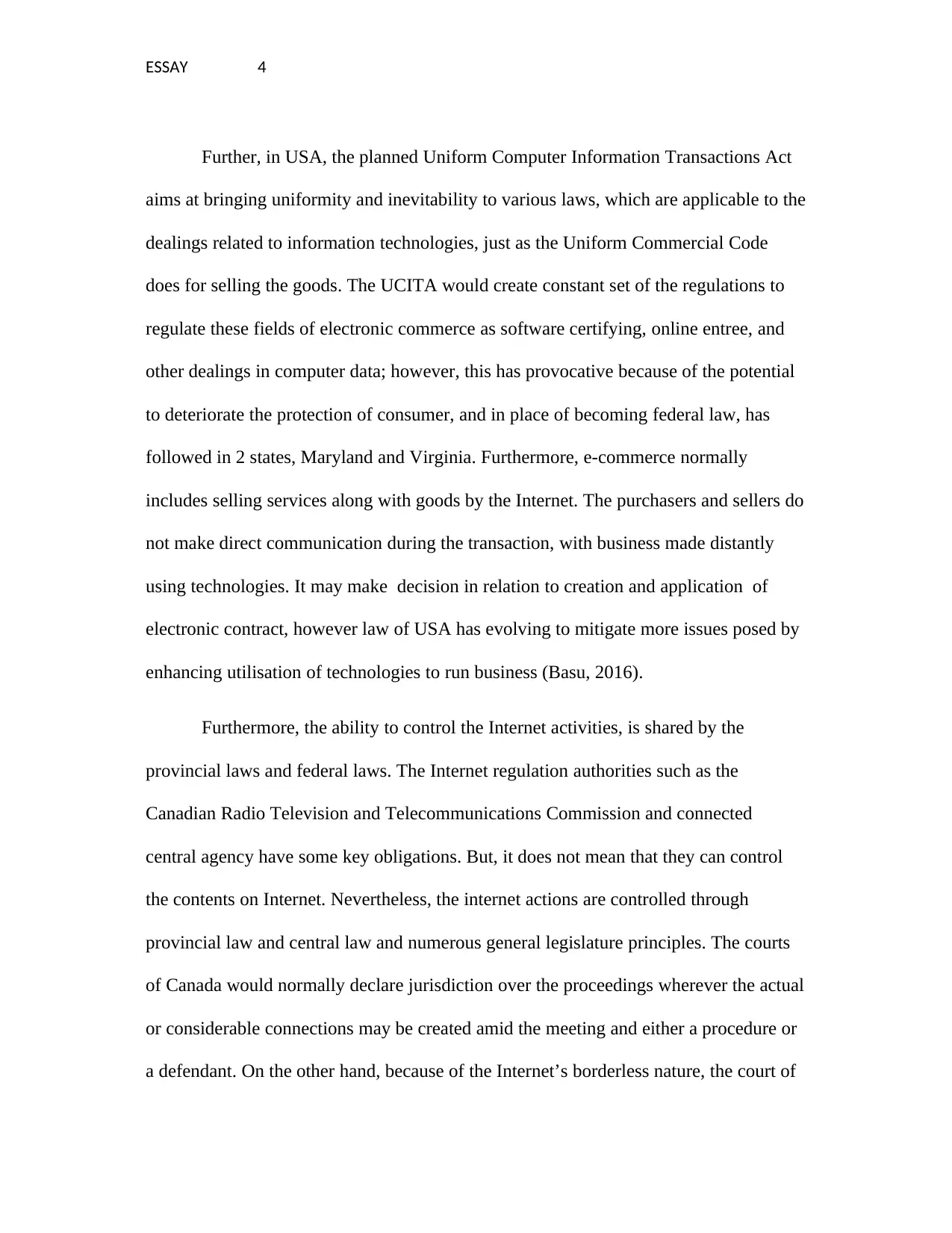
ESSAY 4
Further, in USA, the planned Uniform Computer Information Transactions Act
aims at bringing uniformity and inevitability to various laws, which are applicable to the
dealings related to information technologies, just as the Uniform Commercial Code
does for selling the goods. The UCITA would create constant set of the regulations to
regulate these fields of electronic commerce as software certifying, online entree, and
other dealings in computer data; however, this has provocative because of the potential
to deteriorate the protection of consumer, and in place of becoming federal law, has
followed in 2 states, Maryland and Virginia. Furthermore, e-commerce normally
includes selling services along with goods by the Internet. The purchasers and sellers do
not make direct communication during the transaction, with business made distantly
using technologies. It may make decision in relation to creation and application of
electronic contract, however law of USA has evolving to mitigate more issues posed by
enhancing utilisation of technologies to run business (Basu, 2016).
Furthermore, the ability to control the Internet activities, is shared by the
provincial laws and federal laws. The Internet regulation authorities such as the
Canadian Radio Television and Telecommunications Commission and connected
central agency have some key obligations. But, it does not mean that they can control
the contents on Internet. Nevertheless, the internet actions are controlled through
provincial law and central law and numerous general legislature principles. The courts
of Canada would normally declare jurisdiction over the proceedings wherever the actual
or considerable connections may be created amid the meeting and either a procedure or
a defendant. On the other hand, because of the Internet’s borderless nature, the court of
Further, in USA, the planned Uniform Computer Information Transactions Act
aims at bringing uniformity and inevitability to various laws, which are applicable to the
dealings related to information technologies, just as the Uniform Commercial Code
does for selling the goods. The UCITA would create constant set of the regulations to
regulate these fields of electronic commerce as software certifying, online entree, and
other dealings in computer data; however, this has provocative because of the potential
to deteriorate the protection of consumer, and in place of becoming federal law, has
followed in 2 states, Maryland and Virginia. Furthermore, e-commerce normally
includes selling services along with goods by the Internet. The purchasers and sellers do
not make direct communication during the transaction, with business made distantly
using technologies. It may make decision in relation to creation and application of
electronic contract, however law of USA has evolving to mitigate more issues posed by
enhancing utilisation of technologies to run business (Basu, 2016).
Furthermore, the ability to control the Internet activities, is shared by the
provincial laws and federal laws. The Internet regulation authorities such as the
Canadian Radio Television and Telecommunications Commission and connected
central agency have some key obligations. But, it does not mean that they can control
the contents on Internet. Nevertheless, the internet actions are controlled through
provincial law and central law and numerous general legislature principles. The courts
of Canada would normally declare jurisdiction over the proceedings wherever the actual
or considerable connections may be created amid the meeting and either a procedure or
a defendant. On the other hand, because of the Internet’s borderless nature, the court of
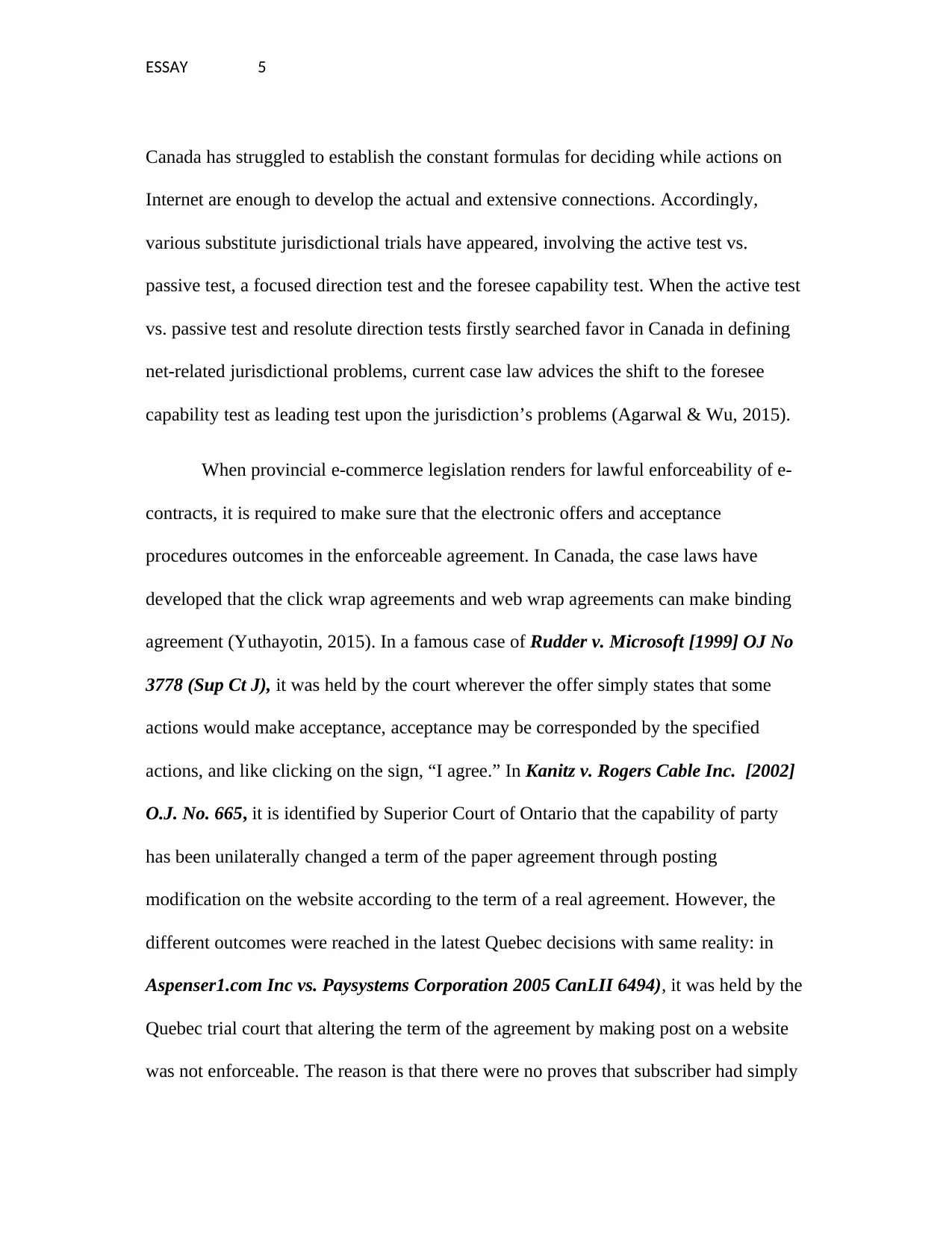
ESSAY 5
Canada has struggled to establish the constant formulas for deciding while actions on
Internet are enough to develop the actual and extensive connections. Accordingly,
various substitute jurisdictional trials have appeared, involving the active test vs.
passive test, a focused direction test and the foresee capability test. When the active test
vs. passive test and resolute direction tests firstly searched favor in Canada in defining
net-related jurisdictional problems, current case law advices the shift to the foresee
capability test as leading test upon the jurisdiction’s problems (Agarwal & Wu, 2015).
When provincial e-commerce legislation renders for lawful enforceability of e-
contracts, it is required to make sure that the electronic offers and acceptance
procedures outcomes in the enforceable agreement. In Canada, the case laws have
developed that the click wrap agreements and web wrap agreements can make binding
agreement (Yuthayotin, 2015). In a famous case of Rudder v. Microsoft [1999] OJ No
3778 (Sup Ct J), it was held by the court wherever the offer simply states that some
actions would make acceptance, acceptance may be corresponded by the specified
actions, and like clicking on the sign, “I agree.” In Kanitz v. Rogers Cable Inc. [2002]
O.J. No. 665, it is identified by Superior Court of Ontario that the capability of party
has been unilaterally changed a term of the paper agreement through posting
modification on the website according to the term of a real agreement. However, the
different outcomes were reached in the latest Quebec decisions with same reality: in
Aspenser1.com Inc vs. Paysystems Corporation 2005 CanLII 6494), it was held by the
Quebec trial court that altering the term of the agreement by making post on a website
was not enforceable. The reason is that there were no proves that subscriber had simply
Canada has struggled to establish the constant formulas for deciding while actions on
Internet are enough to develop the actual and extensive connections. Accordingly,
various substitute jurisdictional trials have appeared, involving the active test vs.
passive test, a focused direction test and the foresee capability test. When the active test
vs. passive test and resolute direction tests firstly searched favor in Canada in defining
net-related jurisdictional problems, current case law advices the shift to the foresee
capability test as leading test upon the jurisdiction’s problems (Agarwal & Wu, 2015).
When provincial e-commerce legislation renders for lawful enforceability of e-
contracts, it is required to make sure that the electronic offers and acceptance
procedures outcomes in the enforceable agreement. In Canada, the case laws have
developed that the click wrap agreements and web wrap agreements can make binding
agreement (Yuthayotin, 2015). In a famous case of Rudder v. Microsoft [1999] OJ No
3778 (Sup Ct J), it was held by the court wherever the offer simply states that some
actions would make acceptance, acceptance may be corresponded by the specified
actions, and like clicking on the sign, “I agree.” In Kanitz v. Rogers Cable Inc. [2002]
O.J. No. 665, it is identified by Superior Court of Ontario that the capability of party
has been unilaterally changed a term of the paper agreement through posting
modification on the website according to the term of a real agreement. However, the
different outcomes were reached in the latest Quebec decisions with same reality: in
Aspenser1.com Inc vs. Paysystems Corporation 2005 CanLII 6494), it was held by the
Quebec trial court that altering the term of the agreement by making post on a website
was not enforceable. The reason is that there were no proves that subscriber had simply
⊘ This is a preview!⊘
Do you want full access?
Subscribe today to unlock all pages.

Trusted by 1+ million students worldwide
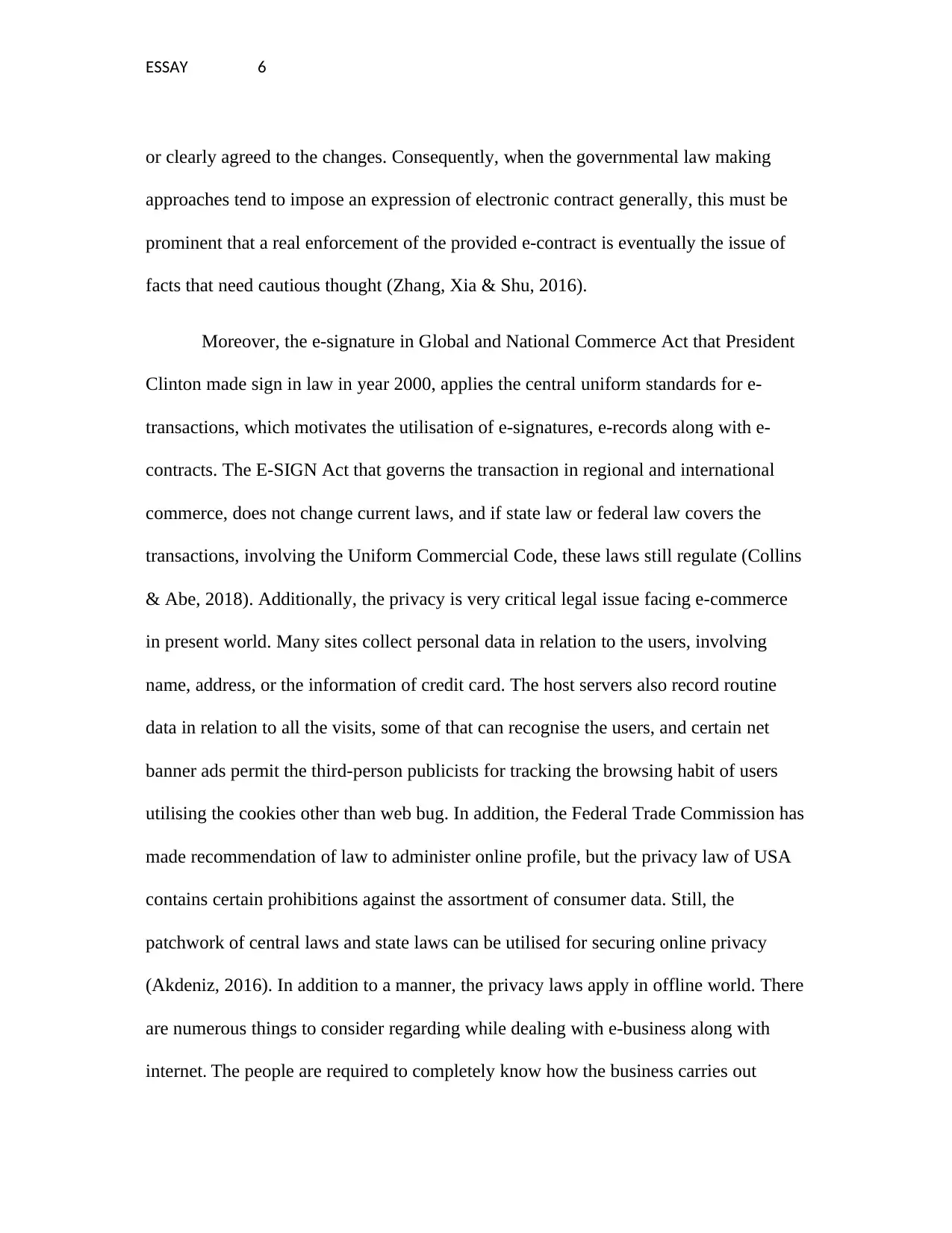
ESSAY 6
or clearly agreed to the changes. Consequently, when the governmental law making
approaches tend to impose an expression of electronic contract generally, this must be
prominent that a real enforcement of the provided e-contract is eventually the issue of
facts that need cautious thought (Zhang, Xia & Shu, 2016).
Moreover, the e-signature in Global and National Commerce Act that President
Clinton made sign in law in year 2000, applies the central uniform standards for e-
transactions, which motivates the utilisation of e-signatures, e-records along with e-
contracts. The E-SIGN Act that governs the transaction in regional and international
commerce, does not change current laws, and if state law or federal law covers the
transactions, involving the Uniform Commercial Code, these laws still regulate (Collins
& Abe, 2018). Additionally, the privacy is very critical legal issue facing e-commerce
in present world. Many sites collect personal data in relation to the users, involving
name, address, or the information of credit card. The host servers also record routine
data in relation to all the visits, some of that can recognise the users, and certain net
banner ads permit the third-person publicists for tracking the browsing habit of users
utilising the cookies other than web bug. In addition, the Federal Trade Commission has
made recommendation of law to administer online profile, but the privacy law of USA
contains certain prohibitions against the assortment of consumer data. Still, the
patchwork of central laws and state laws can be utilised for securing online privacy
(Akdeniz, 2016). In addition to a manner, the privacy laws apply in offline world. There
are numerous things to consider regarding while dealing with e-business along with
internet. The people are required to completely know how the business carries out
or clearly agreed to the changes. Consequently, when the governmental law making
approaches tend to impose an expression of electronic contract generally, this must be
prominent that a real enforcement of the provided e-contract is eventually the issue of
facts that need cautious thought (Zhang, Xia & Shu, 2016).
Moreover, the e-signature in Global and National Commerce Act that President
Clinton made sign in law in year 2000, applies the central uniform standards for e-
transactions, which motivates the utilisation of e-signatures, e-records along with e-
contracts. The E-SIGN Act that governs the transaction in regional and international
commerce, does not change current laws, and if state law or federal law covers the
transactions, involving the Uniform Commercial Code, these laws still regulate (Collins
& Abe, 2018). Additionally, the privacy is very critical legal issue facing e-commerce
in present world. Many sites collect personal data in relation to the users, involving
name, address, or the information of credit card. The host servers also record routine
data in relation to all the visits, some of that can recognise the users, and certain net
banner ads permit the third-person publicists for tracking the browsing habit of users
utilising the cookies other than web bug. In addition, the Federal Trade Commission has
made recommendation of law to administer online profile, but the privacy law of USA
contains certain prohibitions against the assortment of consumer data. Still, the
patchwork of central laws and state laws can be utilised for securing online privacy
(Akdeniz, 2016). In addition to a manner, the privacy laws apply in offline world. There
are numerous things to consider regarding while dealing with e-business along with
internet. The people are required to completely know how the business carries out
Paraphrase This Document
Need a fresh take? Get an instant paraphrase of this document with our AI Paraphraser
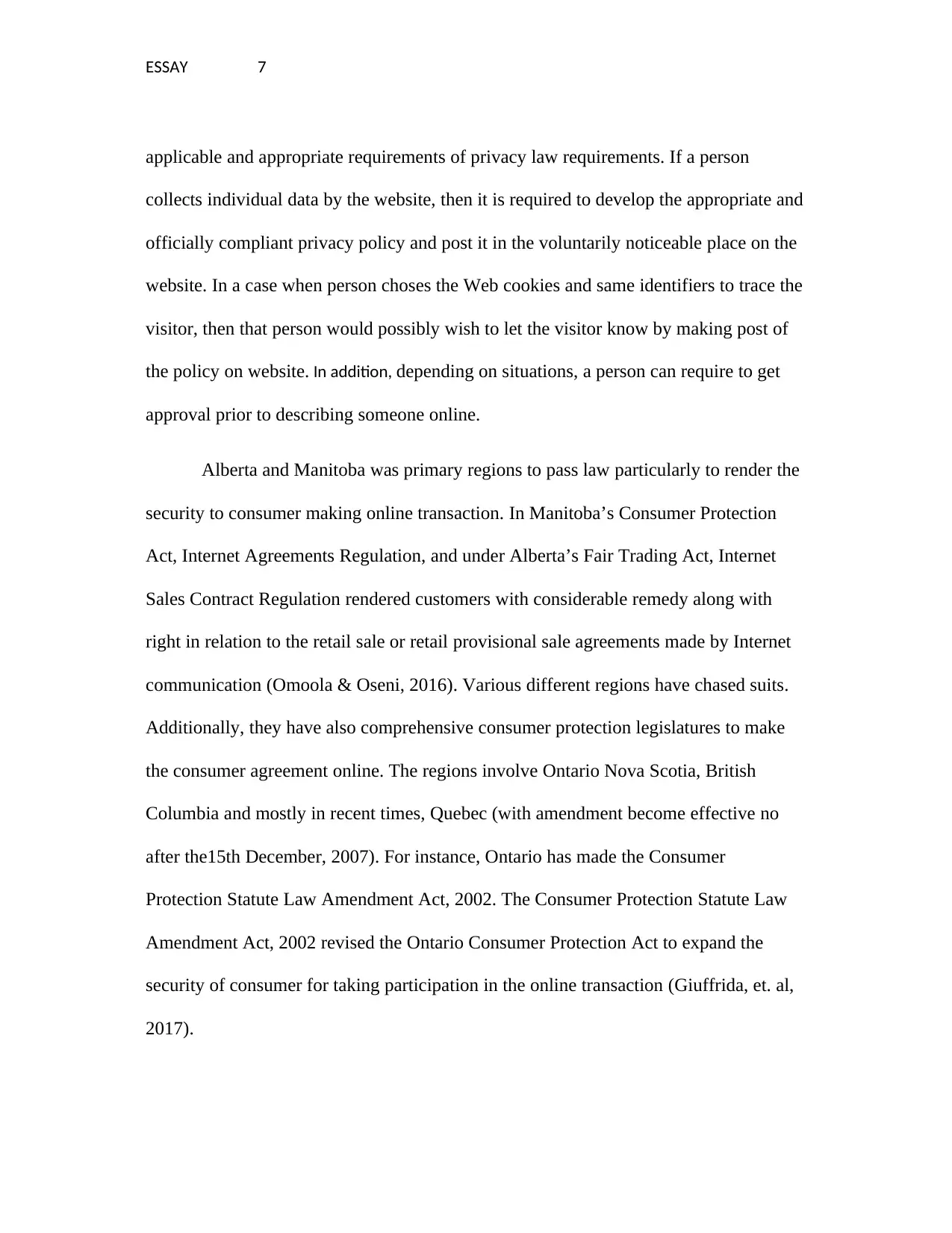
ESSAY 7
applicable and appropriate requirements of privacy law requirements. If a person
collects individual data by the website, then it is required to develop the appropriate and
officially compliant privacy policy and post it in the voluntarily noticeable place on the
website. In a case when person choses the Web cookies and same identifiers to trace the
visitor, then that person would possibly wish to let the visitor know by making post of
the policy on website. In addition, depending on situations, a person can require to get
approval prior to describing someone online.
Alberta and Manitoba was primary regions to pass law particularly to render the
security to consumer making online transaction. In Manitoba’s Consumer Protection
Act, Internet Agreements Regulation, and under Alberta’s Fair Trading Act, Internet
Sales Contract Regulation rendered customers with considerable remedy along with
right in relation to the retail sale or retail provisional sale agreements made by Internet
communication (Omoola & Oseni, 2016). Various different regions have chased suits.
Additionally, they have also comprehensive consumer protection legislatures to make
the consumer agreement online. The regions involve Ontario Nova Scotia, British
Columbia and mostly in recent times, Quebec (with amendment become effective no
after the15th December, 2007). For instance, Ontario has made the Consumer
Protection Statute Law Amendment Act, 2002. The Consumer Protection Statute Law
Amendment Act, 2002 revised the Ontario Consumer Protection Act to expand the
security of consumer for taking participation in the online transaction (Giuffrida, et. al,
2017).
applicable and appropriate requirements of privacy law requirements. If a person
collects individual data by the website, then it is required to develop the appropriate and
officially compliant privacy policy and post it in the voluntarily noticeable place on the
website. In a case when person choses the Web cookies and same identifiers to trace the
visitor, then that person would possibly wish to let the visitor know by making post of
the policy on website. In addition, depending on situations, a person can require to get
approval prior to describing someone online.
Alberta and Manitoba was primary regions to pass law particularly to render the
security to consumer making online transaction. In Manitoba’s Consumer Protection
Act, Internet Agreements Regulation, and under Alberta’s Fair Trading Act, Internet
Sales Contract Regulation rendered customers with considerable remedy along with
right in relation to the retail sale or retail provisional sale agreements made by Internet
communication (Omoola & Oseni, 2016). Various different regions have chased suits.
Additionally, they have also comprehensive consumer protection legislatures to make
the consumer agreement online. The regions involve Ontario Nova Scotia, British
Columbia and mostly in recent times, Quebec (with amendment become effective no
after the15th December, 2007). For instance, Ontario has made the Consumer
Protection Statute Law Amendment Act, 2002. The Consumer Protection Statute Law
Amendment Act, 2002 revised the Ontario Consumer Protection Act to expand the
security of consumer for taking participation in the online transaction (Giuffrida, et. al,
2017).
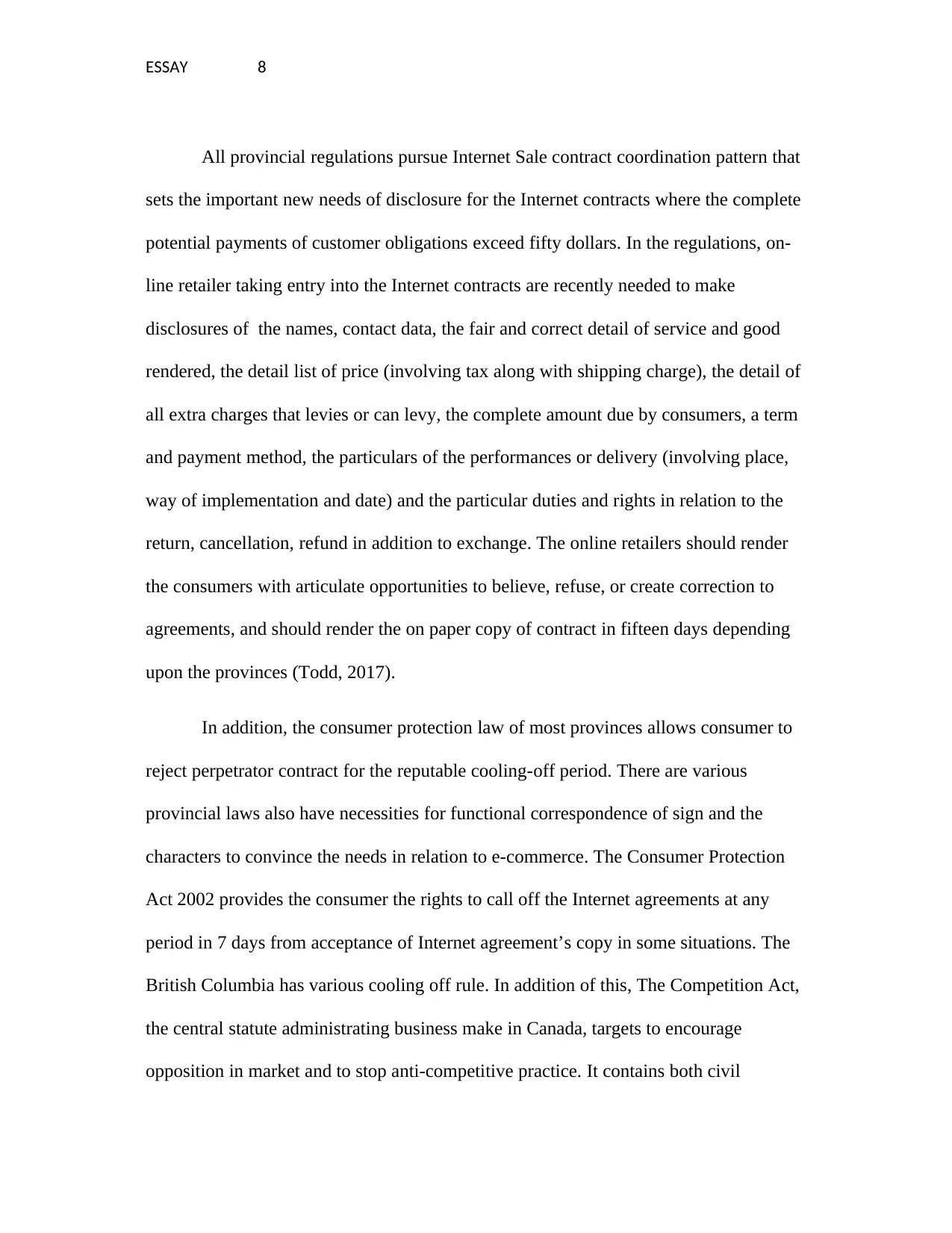
ESSAY 8
All provincial regulations pursue Internet Sale contract coordination pattern that
sets the important new needs of disclosure for the Internet contracts where the complete
potential payments of customer obligations exceed fifty dollars. In the regulations, on-
line retailer taking entry into the Internet contracts are recently needed to make
disclosures of the names, contact data, the fair and correct detail of service and good
rendered, the detail list of price (involving tax along with shipping charge), the detail of
all extra charges that levies or can levy, the complete amount due by consumers, a term
and payment method, the particulars of the performances or delivery (involving place,
way of implementation and date) and the particular duties and rights in relation to the
return, cancellation, refund in addition to exchange. The online retailers should render
the consumers with articulate opportunities to believe, refuse, or create correction to
agreements, and should render the on paper copy of contract in fifteen days depending
upon the provinces (Todd, 2017).
In addition, the consumer protection law of most provinces allows consumer to
reject perpetrator contract for the reputable cooling-off period. There are various
provincial laws also have necessities for functional correspondence of sign and the
characters to convince the needs in relation to e-commerce. The Consumer Protection
Act 2002 provides the consumer the rights to call off the Internet agreements at any
period in 7 days from acceptance of Internet agreement’s copy in some situations. The
British Columbia has various cooling off rule. In addition of this, The Competition Act,
the central statute administrating business make in Canada, targets to encourage
opposition in market and to stop anti-competitive practice. It contains both civil
All provincial regulations pursue Internet Sale contract coordination pattern that
sets the important new needs of disclosure for the Internet contracts where the complete
potential payments of customer obligations exceed fifty dollars. In the regulations, on-
line retailer taking entry into the Internet contracts are recently needed to make
disclosures of the names, contact data, the fair and correct detail of service and good
rendered, the detail list of price (involving tax along with shipping charge), the detail of
all extra charges that levies or can levy, the complete amount due by consumers, a term
and payment method, the particulars of the performances or delivery (involving place,
way of implementation and date) and the particular duties and rights in relation to the
return, cancellation, refund in addition to exchange. The online retailers should render
the consumers with articulate opportunities to believe, refuse, or create correction to
agreements, and should render the on paper copy of contract in fifteen days depending
upon the provinces (Todd, 2017).
In addition, the consumer protection law of most provinces allows consumer to
reject perpetrator contract for the reputable cooling-off period. There are various
provincial laws also have necessities for functional correspondence of sign and the
characters to convince the needs in relation to e-commerce. The Consumer Protection
Act 2002 provides the consumer the rights to call off the Internet agreements at any
period in 7 days from acceptance of Internet agreement’s copy in some situations. The
British Columbia has various cooling off rule. In addition of this, The Competition Act,
the central statute administrating business make in Canada, targets to encourage
opposition in market and to stop anti-competitive practice. It contains both civil
⊘ This is a preview!⊘
Do you want full access?
Subscribe today to unlock all pages.

Trusted by 1+ million students worldwide
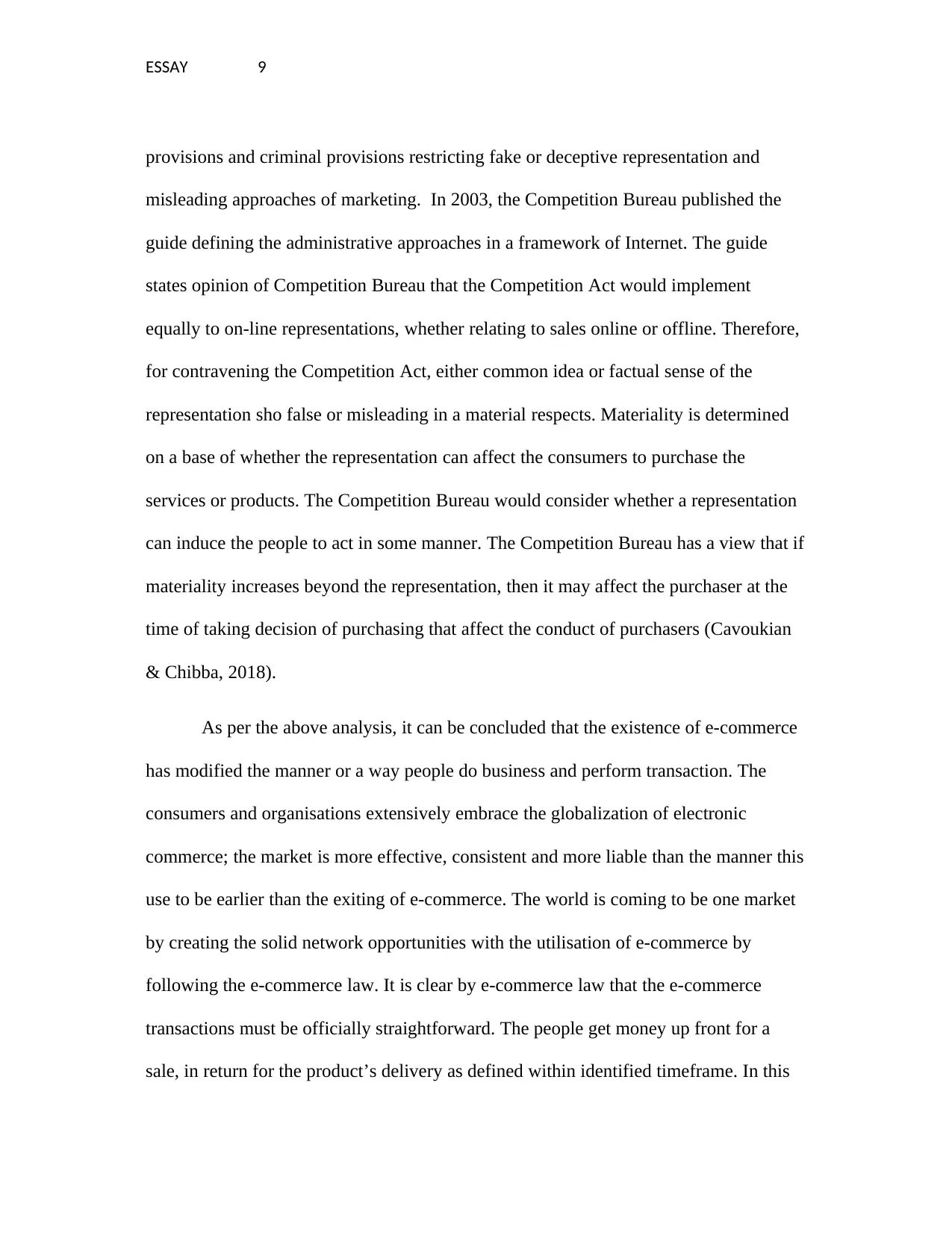
ESSAY 9
provisions and criminal provisions restricting fake or deceptive representation and
misleading approaches of marketing. In 2003, the Competition Bureau published the
guide defining the administrative approaches in a framework of Internet. The guide
states opinion of Competition Bureau that the Competition Act would implement
equally to on-line representations, whether relating to sales online or offline. Therefore,
for contravening the Competition Act, either common idea or factual sense of the
representation sho false or misleading in a material respects. Materiality is determined
on a base of whether the representation can affect the consumers to purchase the
services or products. The Competition Bureau would consider whether a representation
can induce the people to act in some manner. The Competition Bureau has a view that if
materiality increases beyond the representation, then it may affect the purchaser at the
time of taking decision of purchasing that affect the conduct of purchasers (Cavoukian
& Chibba, 2018).
As per the above analysis, it can be concluded that the existence of e-commerce
has modified the manner or a way people do business and perform transaction. The
consumers and organisations extensively embrace the globalization of electronic
commerce; the market is more effective, consistent and more liable than the manner this
use to be earlier than the exiting of e-commerce. The world is coming to be one market
by creating the solid network opportunities with the utilisation of e-commerce by
following the e-commerce law. It is clear by e-commerce law that the e-commerce
transactions must be officially straightforward. The people get money up front for a
sale, in return for the product’s delivery as defined within identified timeframe. In this
provisions and criminal provisions restricting fake or deceptive representation and
misleading approaches of marketing. In 2003, the Competition Bureau published the
guide defining the administrative approaches in a framework of Internet. The guide
states opinion of Competition Bureau that the Competition Act would implement
equally to on-line representations, whether relating to sales online or offline. Therefore,
for contravening the Competition Act, either common idea or factual sense of the
representation sho false or misleading in a material respects. Materiality is determined
on a base of whether the representation can affect the consumers to purchase the
services or products. The Competition Bureau would consider whether a representation
can induce the people to act in some manner. The Competition Bureau has a view that if
materiality increases beyond the representation, then it may affect the purchaser at the
time of taking decision of purchasing that affect the conduct of purchasers (Cavoukian
& Chibba, 2018).
As per the above analysis, it can be concluded that the existence of e-commerce
has modified the manner or a way people do business and perform transaction. The
consumers and organisations extensively embrace the globalization of electronic
commerce; the market is more effective, consistent and more liable than the manner this
use to be earlier than the exiting of e-commerce. The world is coming to be one market
by creating the solid network opportunities with the utilisation of e-commerce by
following the e-commerce law. It is clear by e-commerce law that the e-commerce
transactions must be officially straightforward. The people get money up front for a
sale, in return for the product’s delivery as defined within identified timeframe. In this
Paraphrase This Document
Need a fresh take? Get an instant paraphrase of this document with our AI Paraphraser
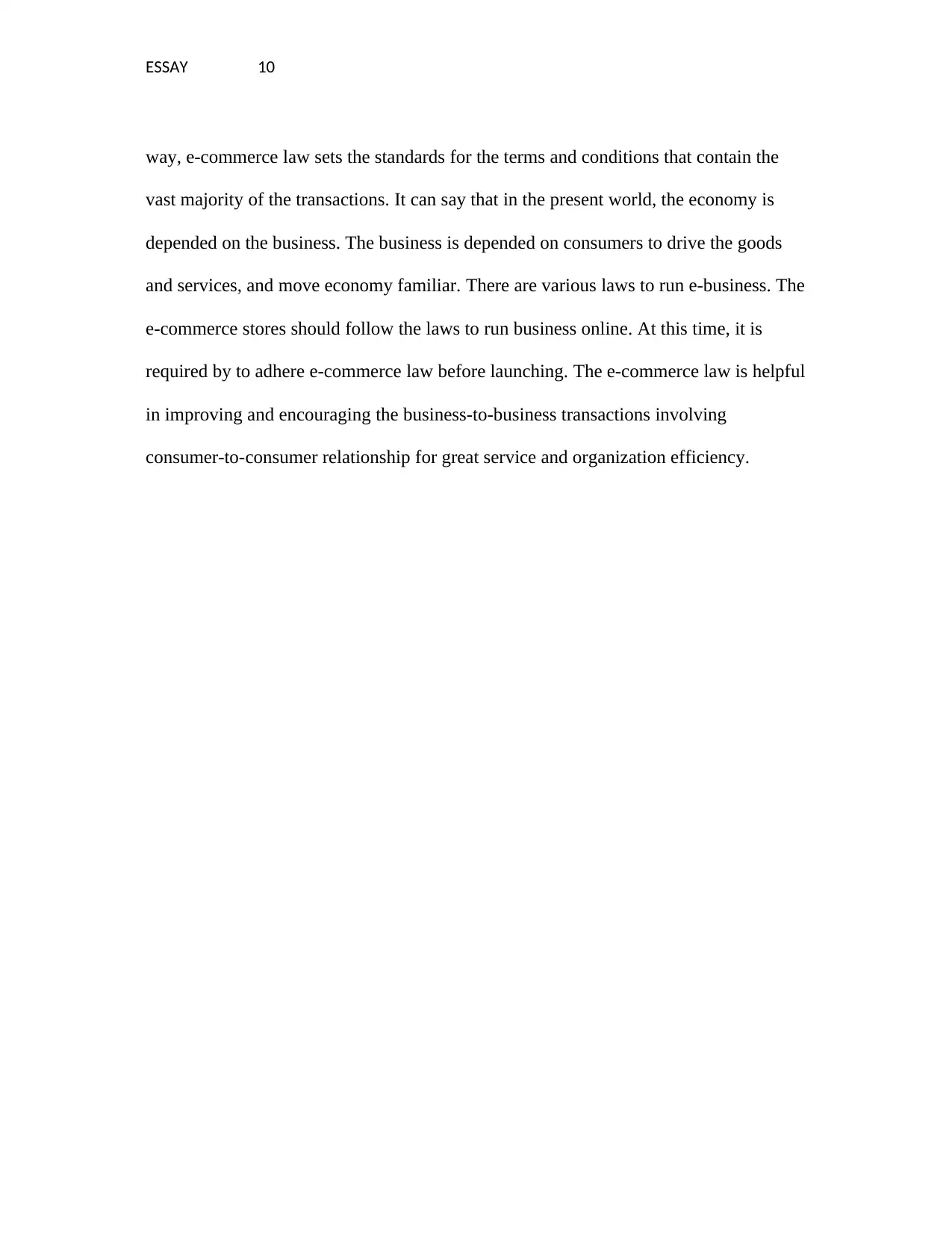
ESSAY 10
way, e-commerce law sets the standards for the terms and conditions that contain the
vast majority of the transactions. It can say that in the present world, the economy is
depended on the business. The business is depended on consumers to drive the goods
and services, and move economy familiar. There are various laws to run e-business. The
e-commerce stores should follow the laws to run business online. At this time, it is
required by to adhere e-commerce law before launching. The e-commerce law is helpful
in improving and encouraging the business-to-business transactions involving
consumer-to-consumer relationship for great service and organization efficiency.
way, e-commerce law sets the standards for the terms and conditions that contain the
vast majority of the transactions. It can say that in the present world, the economy is
depended on the business. The business is depended on consumers to drive the goods
and services, and move economy familiar. There are various laws to run e-business. The
e-commerce stores should follow the laws to run business online. At this time, it is
required by to adhere e-commerce law before launching. The e-commerce law is helpful
in improving and encouraging the business-to-business transactions involving
consumer-to-consumer relationship for great service and organization efficiency.
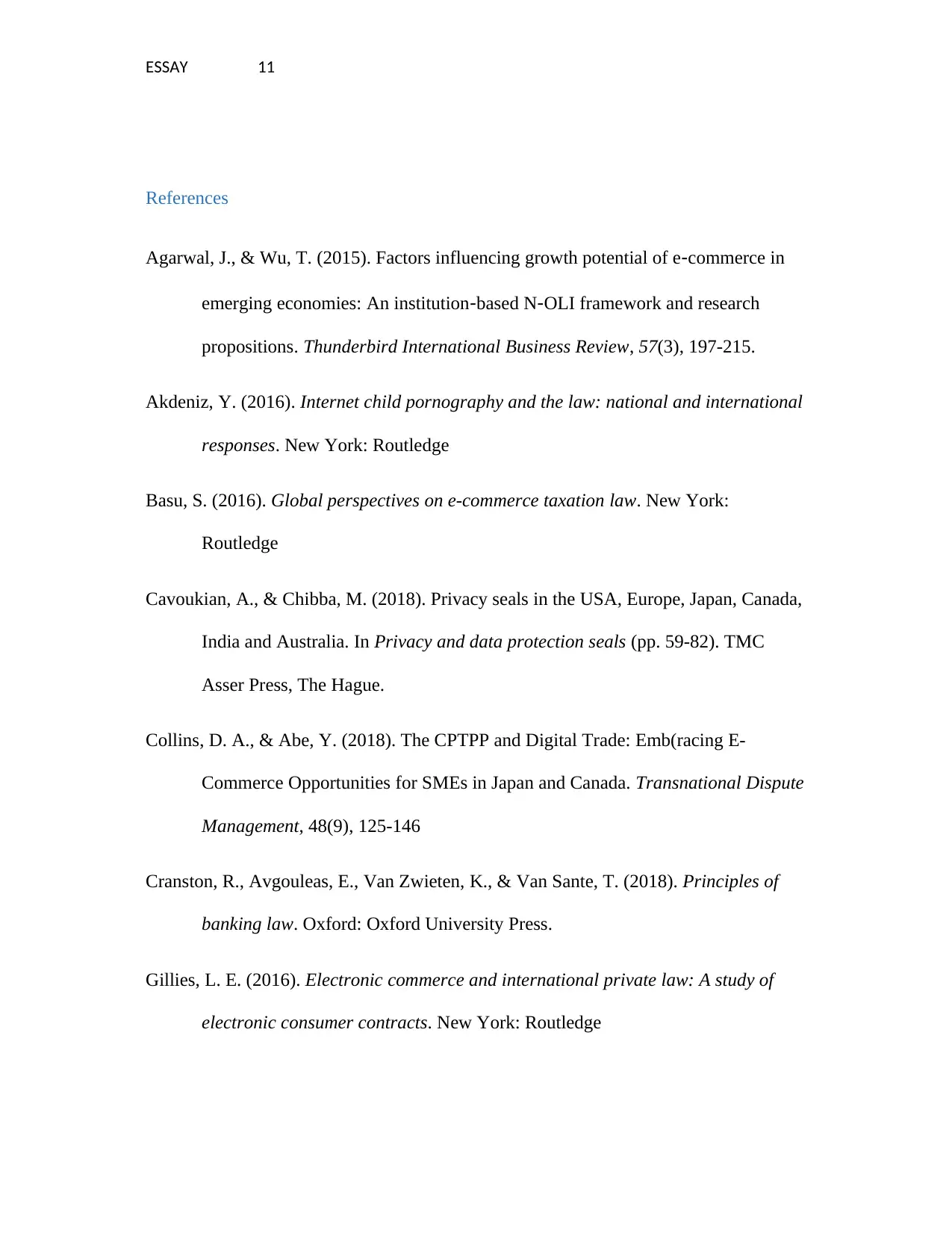
ESSAY 11
References
Agarwal, J., & Wu, T. (2015). Factors influencing growth potential of e‐commerce in
emerging economies: An institution‐based N‐OLI framework and research
propositions. Thunderbird International Business Review, 57(3), 197-215.
Akdeniz, Y. (2016). Internet child pornography and the law: national and international
responses. New York: Routledge
Basu, S. (2016). Global perspectives on e-commerce taxation law. New York:
Routledge
Cavoukian, A., & Chibba, M. (2018). Privacy seals in the USA, Europe, Japan, Canada,
India and Australia. In Privacy and data protection seals (pp. 59-82). TMC
Asser Press, The Hague.
Collins, D. A., & Abe, Y. (2018). The CPTPP and Digital Trade: Emb(racing E-
Commerce Opportunities for SMEs in Japan and Canada. Transnational Dispute
Management, 48(9), 125-146
Cranston, R., Avgouleas, E., Van Zwieten, K., & Van Sante, T. (2018). Principles of
banking law. Oxford: Oxford University Press.
Gillies, L. E. (2016). Electronic commerce and international private law: A study of
electronic consumer contracts. New York: Routledge
References
Agarwal, J., & Wu, T. (2015). Factors influencing growth potential of e‐commerce in
emerging economies: An institution‐based N‐OLI framework and research
propositions. Thunderbird International Business Review, 57(3), 197-215.
Akdeniz, Y. (2016). Internet child pornography and the law: national and international
responses. New York: Routledge
Basu, S. (2016). Global perspectives on e-commerce taxation law. New York:
Routledge
Cavoukian, A., & Chibba, M. (2018). Privacy seals in the USA, Europe, Japan, Canada,
India and Australia. In Privacy and data protection seals (pp. 59-82). TMC
Asser Press, The Hague.
Collins, D. A., & Abe, Y. (2018). The CPTPP and Digital Trade: Emb(racing E-
Commerce Opportunities for SMEs in Japan and Canada. Transnational Dispute
Management, 48(9), 125-146
Cranston, R., Avgouleas, E., Van Zwieten, K., & Van Sante, T. (2018). Principles of
banking law. Oxford: Oxford University Press.
Gillies, L. E. (2016). Electronic commerce and international private law: A study of
electronic consumer contracts. New York: Routledge
⊘ This is a preview!⊘
Do you want full access?
Subscribe today to unlock all pages.

Trusted by 1+ million students worldwide
1 out of 13
Related Documents
Your All-in-One AI-Powered Toolkit for Academic Success.
+13062052269
info@desklib.com
Available 24*7 on WhatsApp / Email
![[object Object]](/_next/static/media/star-bottom.7253800d.svg)
Unlock your academic potential
Copyright © 2020–2026 A2Z Services. All Rights Reserved. Developed and managed by ZUCOL.





